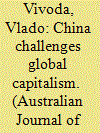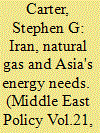|
|
|
Sort Order |
|
|
|
Items / Page
|
|
|
|
|
|
|
| Srl | Item |
| 1 |
ID:
086572


|
|
|
|
|
| Publication |
2009.
|
| Summary/Abstract |
This paper establishes a novel understanding of the nature and implications of China's rise. By borrowing Robert Gilpin's concept of sub-optimisation, it is argued that China is the most prominent player in a non-Western subgroup's suboptimisation strategy, which undermines the Western-dominated neoliberal capitalist system, or the Washington Consensus, and liberal democratic values, taken as gospel by Western economists, governments and industry for the past 30 years. While China and other non-Western states are a part of this system, a consequence of their actions within the system, and particularly in the international energy markets, is that they are increasing their relative gains at the expense of the larger group. China-led subgroup's suboptimisation strategy may result in direct competition between the predominant neoliberal Western paradigm, which is synonymous with globalisation, and which has entered into a structural crisis, and the emerging non-Western economic and political capitalist model.
|
|
|
|
|
|
|
|
|
|
|
|
|
|
|
|
| 2 |
ID:
130933


|
|
|
|
|
| Publication |
2014.
|
| Summary/Abstract |
Demand for natural gas in Asia has grown steadily during the past decade and is expected to increase considerably in the next 20 years. This growth in demand has paralleled an increasingly aggressive regime of international sanctions on Iran over its nuclear-weapons program. Considering the importance of maintaining economic pressure and political solidarity in sanctions regimes, the projected growth of demand for natural gas in some of the world's fastest-growing economies is creating both short- and long-term strategic implications for the United States and its allies. With one of the world's largest reserves of natural gas and an enviable geographical location as a likely hub for energy transit, Iran is in an excellent strategic position to benefit economically and politically from this growth in demand. While recent sanctions have dealt a damaging blow to Iran's oil exports and economy, agreement on sanctions on Iran's underdeveloped natural-gas industry has been more tepid, as nations such as Pakistan, India and China, among others, candidly weigh their options to solve increasingly dire short-term energy demand and create long-term energy security. Development of Iran's natural-gas industry to the point at which is it is able to meet demand in these nations would bring in considerable revenue for the regime, potentially enough to offset much of the economic impact of sanctions. Of particular importance to the United States and its allies, then, are answers to the following questions: Does Iran currently have the infrastructure to meet this demand? How long would it take Iran to develop the necessary infrastructure in the event nations that have expressed interest in Iran's natural gas opt against the pressure of sanctions? How likely are the above-mentioned nations to eventually contravene sanctions? How are changes in the global natural-gas industry impacting Iran's potential share of the regional and international market? And is there enough natural gas from other sources available to meet demand in nations like Pakistan, India and China?
|
|
|
|
|
|
|
|
|
|
|
|
|
|
|
|
|
|
|
|
|